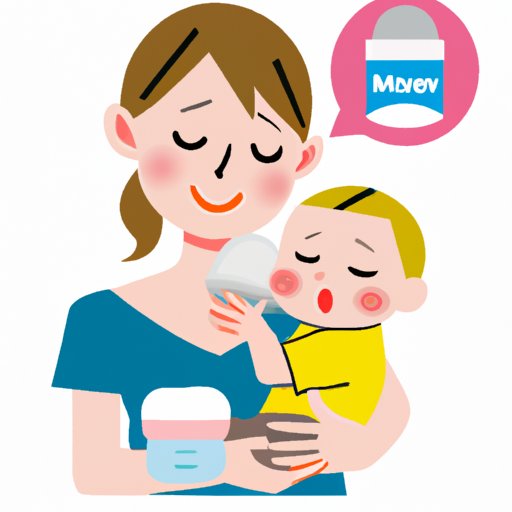
The Truth About Drinking Alcohol While Breastfeeding: Can You Drink and Breastfeed?
As a new mother, you may have many questions about what you can and cannot do while breastfeeding. One common question is whether it is safe to drink alcohol while nursing. The answer is not straightforward, and there are many myths and misconceptions surrounding this topic. In this article, we will explore the truth about drinking and breastfeeding, providing you with the facts and information you need to make an informed decision.
The Truth About Drinking Alcohol While Breastfeeding: Myths and Facts
One of the main myths surrounding drinking and breastfeeding is that alcohol improves milk production. However, this is not true. Drinking alcohol does not increase milk production or quality. Additionally, many people believe that pumping and dumping breast milk after drinking can help get rid of alcohol in the breast milk quickly. This is also a myth. Pumping and dumping does not speed up the process of alcohol elimination from the body.
On the other hand, there are some facts you should consider. According to the American Academy of Pediatrics (AAP), breastfeeding mothers can consume alcohol in moderation, defined as one drink per day. A standard drink is equivalent to 12 ounces of beer, 5 ounces of wine, or 1.5 ounces of distilled spirits. However, it is important to note that alcohol can have potential risks for both the mother and the baby.
10 Things You Need to Know About Drinking and Breastfeeding
1. Timing is key. If you plan to drink, do it right after nursing or pumping.
2. Wait at least two hours after drinking before nursing your baby.
3. Limit your intake to one drink per day.
4. Formula is a safe alternative when you cannot breastfeed.
5. It is never safe to drink excessively while breastfeeding.
6. Pumping and dumping does not speed up the process of alcohol elimination.
7. Drinking while breastfeeding can impair your judgment and reflexes.
8. You may need to wait longer to breastfeed if you are taking certain medications.
9. Excessive alcohol consumption can lead to dehydration and other health problems.
10. Drinking can also affect your milk supply, so monitor your baby’s feeding habits closely.
If you plan to drink, it is important to have a plan in place. Consider having someone else care for your baby while you drink or limit your drinking to one drink and then switch to formula for the next feeding.
Balancing a Drink and a Baby: How to Enjoy a Drink While Nursing
If you choose to drink while nursing, there are a few things you should keep in mind to ensure the safety of your baby. One option is to pump and store enough milk for one or two feedings before you start drinking. This way, you can avoid breastfeeding for a few hours after drinking until the alcohol has left your system.
You can also try drinking right after nursing. This way, you have more time for the alcohol to leave your system before the next feeding. It is important to wait at least two hours after drinking before breastfeeding your baby to ensure that the alcohol has been eliminated from your breast milk.
Another factor to consider is your baby’s age and weight. Younger infants and smaller babies may be more susceptible to the effects of alcohol in breast milk, so it is important to take this into account before drinking.
Alcohol and Breast Milk: What Happens in Your Body?
When you consume alcohol, it passes into your breast milk. The amount of alcohol that ends up in your milk is directly related to the amount of alcohol in your bloodstream. The liver metabolizes the alcohol, but it takes time for this process to occur. The general rule is that it takes about two hours for one drink to be metabolized and eliminated from your body.
Alcohol can also affect the composition and production of breast milk. Studies have shown that alcohol can reduce milk production by as much as 20%, and it can affect the taste and smell of milk, leading some babies to refuse to breastfeed.
One Drink Won’t Hurt, Right? The Effects of Alcohol on Breastfed Babies
While the occasional drink may not harm your baby, excessive alcohol consumption can have negative effects. Drinking too much alcohol can cause drowsiness, lethargy, and even coma in babies. It can also affect a baby’s motor development and can interfere with parent-child bonding.
Additionally, alcohol can slow down a baby’s sucking reflex and can lead to poor feeding habits, which can affect growth and development. In some cases, alcohol consumption can even cause the baby to stop breathing, leading to a life-threatening emergency.
When in Doubt, Don’t Drink: The Safe Approach to Alcohol and Nursing
The safest approach for breastfeeding mothers is to avoid drinking alcohol altogether. If you do choose to drink, limit your intake to one standard drink per day and wait at least two hours after drinking before nursing. It is also important to closely monitor your baby for any signs of discomfort or unusual behavior after breastfeeding.
Remember that your baby’s health and well-being should always be your top priority. If you have concerns about drinking and nursing, talk to your healthcare provider for guidance and support.
Conclusion
In conclusion, drinking while breastfeeding can be safe in moderation, but it is important to understand the risks and take steps to ensure the safety of your baby. Always prioritize your baby’s health and well-being, and if you have any concerns or questions about drinking and breastfeeding, talk to your healthcare provider.




